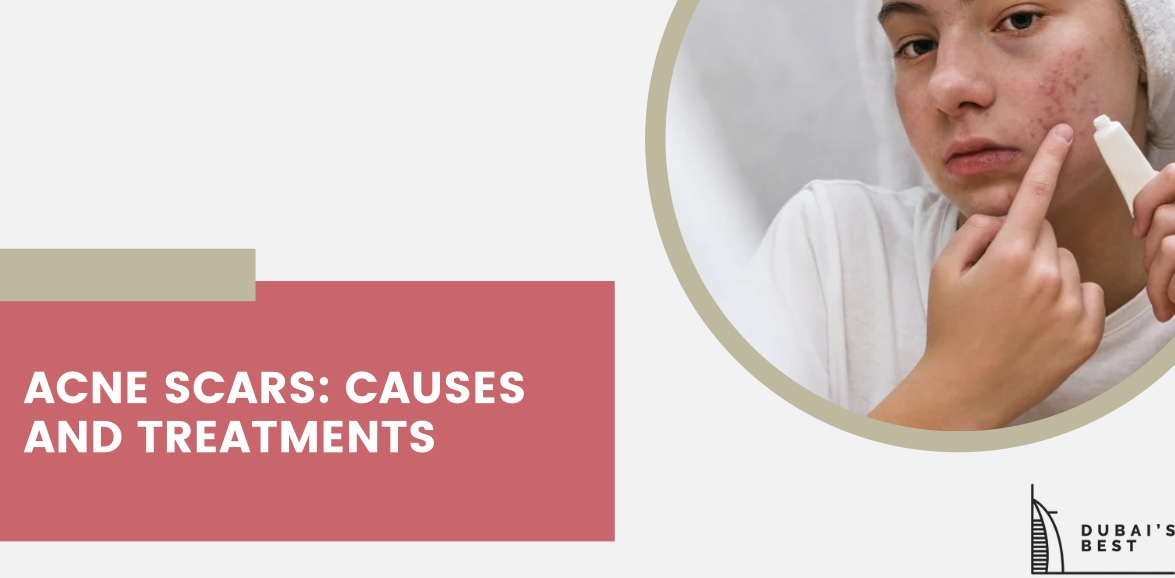Acne Scars: Causes and Treatments
Acne is something that affects most of us at some stage. It can be frustrating and embarrassing, especially when you have acne scars on your face.
Various factors influence the development of acne scars, which we’ll be discussing in the following.
What causes acne?
Acne is one of the most well-known skin conditions globally. Acne begins when the pores in your skin become blocked with oil, dead skin cells, or bacteria.
Each pore is connected to a sebaceous gland, producing an oil called sebum. The sebum carries dead skin cells through the follicle and pore to the surface of your skin.
Acne occurs when too much sebum and dead skin cells clog your pores, causing spots and pimples. Hormones can also play a role in acne.
Our bodies produce more male sex hormones (androgens) during puberty, stimulating oil production and leading to acne flair-ups. Stress can also play a role in acne, so it can be helpful to incorporate self-care habits into your lifestyle.
While it doesn’t cause acne, it may worsen it. Acne is most prevalent during adolescence and usually clears up around age 30 with proper treatment.
For some people, however, acne persists well into adulthood.
How does acne cause scars?
Acne scars are formed when your skin doesn’t heal properly. They usually appear as indentations on the surface of your skin, and they may look like ice pick scars, boxcar scars, or rolling scars.
You can get acne scars if you have severe acne that forms deep nodules or cysts. It’s crucial to treat cystic acne, so it doesn’t leave a permanent scar on your face.
In fact, even mild acne could cause scarring — particularly when you pick at pimples or don’t maintain good skincare.
Types of Acne Scars
- Atrophic scars. These are commonly experienced kinds of acne scars. A tissue loss causes atrophic scars, appearing as indentations in the skin.
- Hypertrophic scars. Hypertrophic scars are raised above the skin. They occur when too much collagen forms in one area instead of spreading out to heal the wound.
- Ice pick scars. Ice pick scars are deep, narrow depressions that occur when fibers beneath your skin tear or break down (collagen and elastin). Over time, ice pick pits may get bigger as collagen fibers continue to break down with age.
Treatments for Acne Scars
Acne scar treatments are best done by a dermatologist who will consider a patient’s unique skin type and acne history before creating an individualized treatment plan.
Dermatologists may use one or more of the following treatments for acne scars:
- Chemical peels. When applied to the scar tissue, chemical solutions help reduce the appearance of scars.
- Laser treatments. Lasers remove outer layers of skin and encourage new collagen growth, which reduces the appearance of scars.
- Fillers. They can be injected into holes in your skin resulting from scarring to make them less noticeable.
- Surgery. This is sometimes used to remove very deep or severe scars. Surgery can also be used with laser treatments to reduce their appearance.
An example of this type of surgical procedure is a facelift, although this isn’t usually the primary reason for getting one.
More than one treatment may be needed for more severe acne scars. Over-the-counter (OTC) products have not been proven effective against acne scars, but some OTC products can help improve the look of milder cases of scarring.
How to Prevent Acne Scars
- Don’t pop pimples. You might be tempted to pop pimples from your skin, but this could lead to scarring.
- Don’t pick at your skin. Scratches, scrapes, and blemishes can become scars, so it’s essential to keep them clean and covered until they heal.
- Don’t scrub your face too hard. Excessive washing can dry your skin, making it more prone to irritation and infection.
- Don’t let acne get you down. One of the best ways to prevent acne scars is by avoiding them, so don’t let worries about future breakouts ruin today’s mood!
- Don’t tan (outside). Tanning will give you a leathery look ten years down the road, and it also makes it harder for new cells (which help repair damaged skin) to grow.
If you have acne scars that can’t be managed with the above treatment, you may always visit a doctor or plastic surgeon. There are several treatment plans fit for your needs; just be sure to visit the right clinic.
Also, don’t forget to bring your health insurance with you if insurance covers your procedure or treatment.

